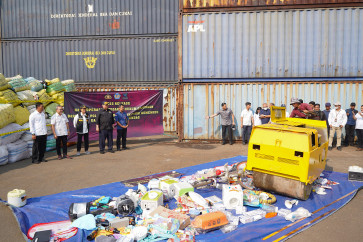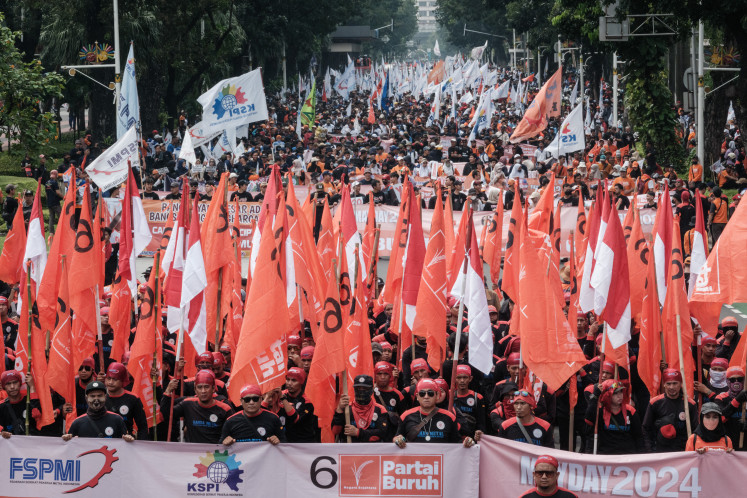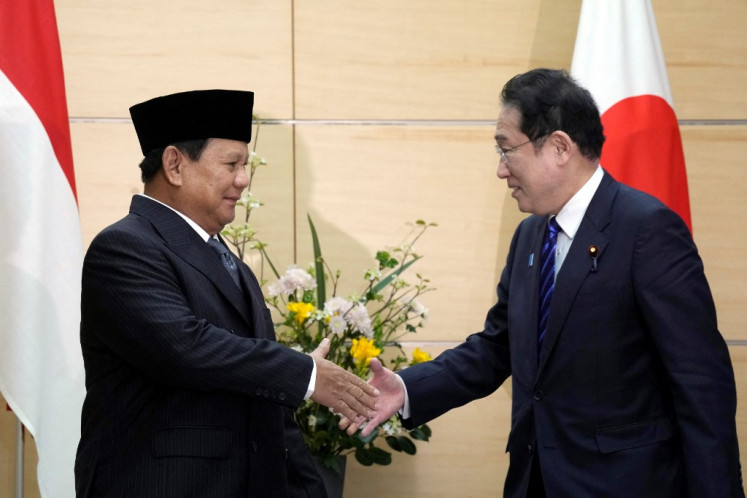Tax office keeps sending emails to taxpayers
As the clock ticks down toward the end of the tax amnesty on March 31, the country’s tax authority continues to pressure small taxpayers by sending more warnings of penalties via email to almost one million individual taxpayers that it claims as having undeclared assets
Change Size

A
s the clock ticks down toward the end of the tax amnesty on March 31, the country’s tax authority continues to pressure small taxpayers by sending more warnings of penalties via email to almost one million individual taxpayers that it claims as having undeclared assets.
The warnings had previously been sent to hundreds of similar potential taxpayers, bringing the total targeted figure to more than one million people, said Taxation Director General Ken Dwijugiasteadi.
“We have sent [the emails] to almost one million taxpayers recently because we’re already in the final phase [of the tax amnesty],” he said on the sidelines of an event at the Finance Ministry.
Ken said many taxpayers had not joined the tax amnesty even though only two months remain before the program ends, as the Tax Amnesty Law stipulates that participation is purely voluntary.
Total declared assets had reached Rp 4.34 quadrillion (US$325.12 billion) as of Wednesday, but penalty payments stood at Rp 110 trillion only, still below the target of Rp 165 trillion.
Meanwhile, repatriated funds had only reached Rp 141 trillion, far below the government’s target of Rp 1 quadrillion.
The Taxation Directorate General started sending the warning emails on Dec. 20, 2016, to 204,000 individual taxpayers, urging them to join the tax amnesty.
As many as 5,373 of the 204,000 taxpayers eventually joined the program, with declared assets worth about Rp 16 trillion, according to data from the tax office.
“We have yet to check the data again because taxpayers still have a chance [to join] until March 31 in this final period,” tax office spokesperson Hestu Yoga Saksama said.
The tax office’s own data previously showed that there were 212,000 undeclared assets, mostly in the form of houses, land and vehicles.
It then combined the data with estimates from various institutions, such as the police, the Home Ministry and the National Land Agency (BPN), and ended up with more than two million undeclared assets.
Many taxpayers on the warning list were reportedly questioning the accuracy of the data, as they claimed that they were not deliberately hiding assets.
“There are no issues [on that] because taxpayers can clarify. It is easy,” Ken said, adding they could be charged for hiding assets under Article 18 of the Tax Amnesty Law.
Article 18 stipulates that any undeclared asset owned between Jan. 1, 1985, and Dec. 31, 2015, will be considered as additional income, and subject to a costly penalty, even three years after the tax amnesty has finished.
Finance Minister Sri Mulyani Indrawati said she was aware of the taxpayers’ complaints and acknowledged that the current tax information system needed to be upgraded. She urged taxpayers to file official complaints with the tax authority if they managed to identify inaccuracies on the list of undeclared assets in the warning emails.
However, experts are skeptical that the government can achieve its targets when the program ends due to receding enthusiasm in the second and third phases compared to the first phase.
“This means the awareness campaign for the tax amnesty has yet to achieve its precise goal,” said Yustinus Prastowo, executive director at the Center for Indonesia Taxation Analysis (CITA).
“In the third period of the tax amnesty, [the tax office] should be fiercer, especially in pushing repatriation.”
Sofjan Wanandi, chairman of the Indonesian Employers Association’s (Apindo) advisory board, said there would be no big taxpayers left in the third phase as most of them already participated in the first phase and repatriated their overseas assets.
Sofjan, who is also the chief economic advisor to Vice President Jusuf Kalla, said the final period would mostly focus on widening the taxpayer base for small and medium enterprises (SMEs), adding that the government would continue to monitor disobedient taxpayers post-tax amnesty.
Property tycoon Tan Kian, franchise owner of the Ritz-Carlton and JW Marriot in Jakarta, said that last year he was “among the first to join the tax amnesty, while everybody was waiting for the end of September” and that he repatriated his overseas assets.
“I joined as an individual taxpayer and also acted on behalf of my company. I think all retailers had already joined the tax amnesty because it was not cool not to join,” he said.









